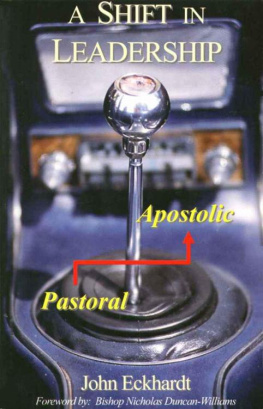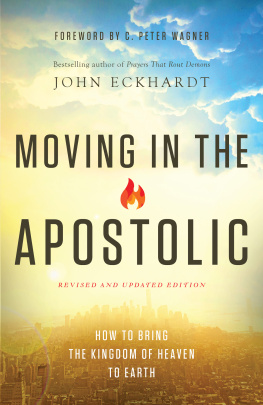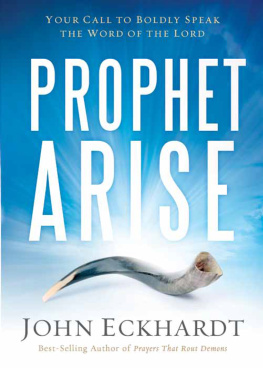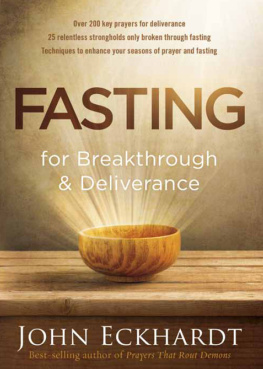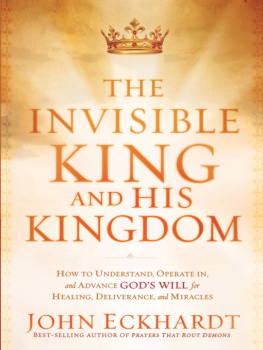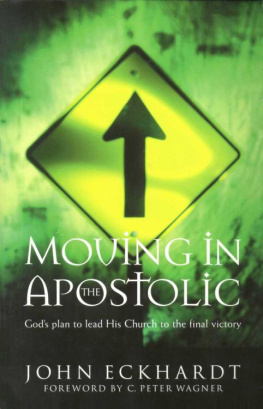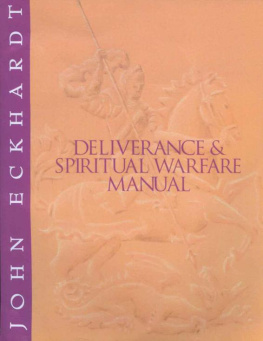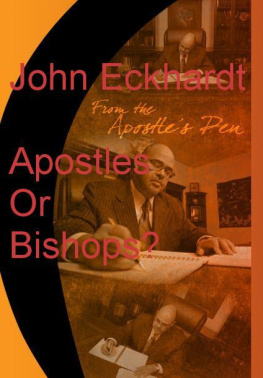John Eckhardt - A Shift in Leadership
Here you can read online John Eckhardt - A Shift in Leadership full text of the book (entire story) in english for free. Download pdf and epub, get meaning, cover and reviews about this ebook. genre: Religion. Description of the work, (preface) as well as reviews are available. Best literature library LitArk.com created for fans of good reading and offers a wide selection of genres:
Romance novel
Science fiction
Adventure
Detective
Science
History
Home and family
Prose
Art
Politics
Computer
Non-fiction
Religion
Business
Children
Humor
Choose a favorite category and find really read worthwhile books. Enjoy immersion in the world of imagination, feel the emotions of the characters or learn something new for yourself, make an fascinating discovery.
- Book:A Shift in Leadership
- Author:
- Genre:
- Rating:3 / 5
- Favourites:Add to favourites
- Your mark:
- 60
- 1
- 2
- 3
- 4
- 5
A Shift in Leadership: summary, description and annotation
We offer to read an annotation, description, summary or preface (depends on what the author of the book "A Shift in Leadership" wrote himself). If you haven't found the necessary information about the book — write in the comments, we will try to find it.
A Shift in Leadership — read online for free the complete book (whole text) full work
Below is the text of the book, divided by pages. System saving the place of the last page read, allows you to conveniently read the book "A Shift in Leadership" online for free, without having to search again every time where you left off. Put a bookmark, and you can go to the page where you finished reading at any time.
Font size:
Interval:
Bookmark:
A Shift in Leadership
(Formerly titled Leader shift: Transitioning from the Pastoral to the Apostolic)
John Eckhardt
Foreword by: Bishop Nicholas Duncan-Williams
A Shift in Leadership
Contents
Foreword
T here is a shifting in the spirit, and the body of Christ is in a time of crucial transition. If the potential leaders in the body of Christ today are going to make the impact expected of them by God, we must become prophetically compliant to what God is saying in the now. My dear friend, Apostle John Eckhardt has received a strong prophetic word from God for the present leadership in the Church, worldwide. Friend, I believe that the cloud has shifted, and there will come sudden changes in leadership within the body of Christ, worldwide. This is why this publication by Apostle Eckhardt is so strategic and crucial.
We must realize that change is of the essence. In Genesis, God clearly told Abraham to sacrifice Isaac, yet later told him not to touch the lad. Did God change His mind? No. God spoke a word to Abraham for a specific time and purpose, and He spoke another timely word to Abraham for another purpose. God didn't want Isaac; He wanted Abraham's heart. He is the same God that told David to ambush the Philistines in one instance and later instructed David not to go after them, but rather to change the strategy.
God in one instance told the prophet Elijah to go to the brook and drink and be fed by ravens. In another instance, He told him to go to the widow of Zarephath and there you will be sustained. What am I saying?
I am saying that we must be a people who learn to hear what God is saying in this hour. If we act on yesterday's word alone, we might miss God. If we are willing to give God our Isaac, He is more than willing to give us Jesus. He wants to give us more of the presence of Jesus in the Church, but it will not come without the inclining of our ears to hear what thus saith the Lord.
The future of the Church hangs in the balance of whether the present leadership will sacrifice its notions of keeping potential apostles in the pastoral office, glued to the pulpits that make them secure. There are thousands of pastors who are not responding to the apostolic call for fear of what their congregations, or even worse, what other pastors will think. They believe that if they are absent from the pulpit for any length of time, the people will leave the church.
Jesus clearly states that He would build His church and that the strategies of hell would not stand against it. So, why don't we obey God and let Him build His church through us, whether your congregation is 50 or 50,000? It has been said that change is the proof of trust. If we truly trust the Lord to build His church, we would change our ways of thinking.
What I am stating here is not some esoteric, theological notion that looks good on paper. I am talking about actually changing your geographical location to affect cities and nations throughout the world through good, old-fashioned obedience to Christ. I am talking about leaving the realms of comfort in order to see the Scriptures come to life in your churches and ministries. I am talking about living lives of sacrifice and embracing the apostolic office to the point of shattering the religious mind-sets which literally kill men and women of God through the overbearing demands of the sheep in the fold.
Friend, realize that God is a progressive God. Whatever the shift of God's emphasis might be, we must not be fearful of the unknown or the unfamiliar. For some, it could be the moving to another geographical location, but for others it might be a change of emphasis. The moving from one mantle to the next is where the conflict lies and where many find the greatest challenge in making the transition. This could be one of the causes of strife in church leadership, financial lack, and even marital struggles. This was the case of Lot. The Lord was bringing Lot out of Sodom, and his wife wasn't willing to make the change. Many leaders will have to employ the grace of God to bring their spouses to the place of understanding the transition.
It is better to obey God and finish your course, like the Apostle Paul did, with controversy, than to live without controversy, having the acceptance of men, and not finish your course. The problem is that we want to avoid controversy, whether it is with our loved ones, our spouses, our congregations, or our friends. This is where we must draw the line. We can choose to have all things appear good and not follow God, and because of the fear of controversy, watch others run the race and finish their course, without participating.
Would you rather live long and have the acceptance of men, but never achieve your purpose in life? Or would you rather live and accept controversy like Jesus, Moses, or David, and achieve your purpose in life? With controversy, they ran the race and they fulfilled their course. We must employ all courage necessary to make choices today that will determine our placement in this prophetic dispensation and in eternity before God.
I have faced many controversies for my willingness to make changes and transitions, as a result of season shiftings in the Spirit, in order to be in compliance with God's prophetic mandate for my life. It will cost you something. You must die in order to live. Paul said , I conferred not with flesh and blood. Friend, in order to live you must be willing to die to all that you are familiar with.
Jesus said in John 10:27, My sheep hear my voice, and I know them, and they follow me. Friend, have you heard the voice of God because He knows you? There are many voices out there, but stay with the Master's voice and follow not another. The reason for hearing His voice is for following, so follow His voice.
This book will challenge you to do just that. It will motivate you, it will cause stirring in your heart, and it will confront things that have never been confronted before. It will cause you to discover the needed answers to your present placement in leadership, for geographical location, for emphasis, and for new assignments.
In conclusion, the revelation in this book will empower you to run as you have never run before, see as you have never seen before, hear as you have never heard before, and give expression to the revelations of God within you that you have never given expression to before. Fight the good fight and finish your course!
Bishop Nicholas Duncan-Williams Presiding Bishop,
Action Churches Worldwide Founder & President,
Prayer Summit International
Chapter 1
The Transition
A s I travel around the world ministering in the area of the restoration of apostolic ministry, I am finding many leaders desiring to transition from a pastoral calling to an apostolic calling. They are realizing that they have a greater calling than just being a pastor of a church. They know they need to make a transition, but do not know the steps they need to take to do it successfully.
This book is written to help leaders make the transition. It will provide wisdom to help churches transition from being pastoral to becoming apostolic. Our experience in Crusaders Church of Chicago helps me to help others in making the transition. We have seen our church make this transition with tremendous results.
We are currently seeing another reformation in the church. We are also experiencing restoration. God is restoring the ministries of apostle and prophet within the local church. As a result of this restoration, we need to reform and change the way we build churches. Unfortunately, tradition has robbed much of the Church from receiving and believing in apostles. The three ministries most churches receive and believe in are the pastor, teacher, and evangelist. Most of the leaders in the local church accept the title and function of "pastor" when it comes to starting and overseeing churches. Most churches have been built around the pastoral anointing.
Font size:
Interval:
Bookmark:
Similar books «A Shift in Leadership»
Look at similar books to A Shift in Leadership. We have selected literature similar in name and meaning in the hope of providing readers with more options to find new, interesting, not yet read works.
Discussion, reviews of the book A Shift in Leadership and just readers' own opinions. Leave your comments, write what you think about the work, its meaning or the main characters. Specify what exactly you liked and what you didn't like, and why you think so.

